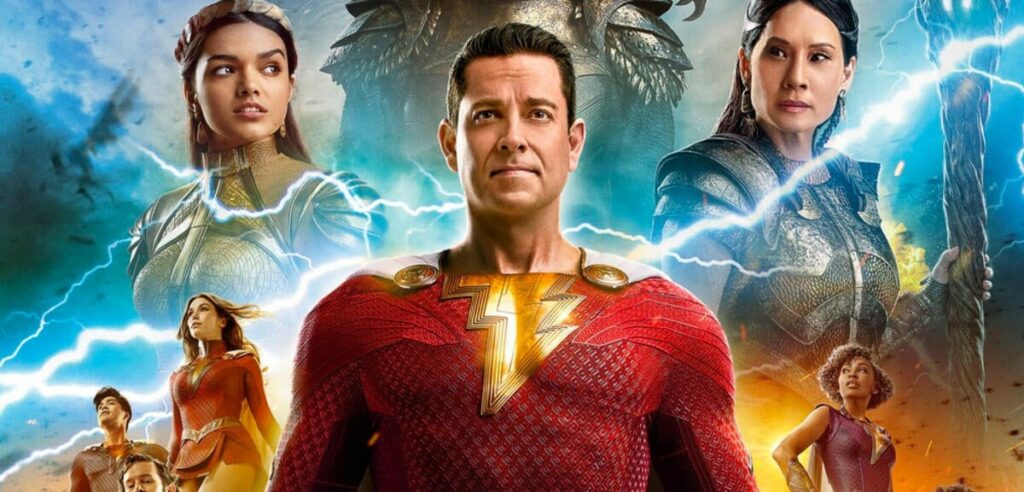As we enter the fourth weekend of March 2023, a familiar pattern has emerged. Despite being a long-running movie franchise, the latest installment has exceeded expectations and received outstanding reviews from both audiences and critics. This trend has been evident throughout the month, with films such as Creed III, Scream VI, and John Wick: Chapter 4 all surpassing their previous box office records and studio projections.
John Wick: Chapter 4, in particular, opened with an impressive $73.5 million, far surpassing the $56.8 million debut of its predecessor, John Wick: Chapter 3, in 2019. It’s hard to believe that the franchise began in 2014 with a meager $14.4 million in its opening weekend.
Although it may seem like a no-brainer that franchises still dominate cinema attendance, there is one notable exception. Sandwiched between the successes of these films is the cautionary tale of Shazam! Fury of the Gods, which defies the modern Hollywood belief that everything must be part of a franchise or shared cinematic universe.

Although some of us thought the DC sequel was pretty good, the box office performance of Shazam 2 has been a public debacle. Despite the film’s actual quality, it failed to meet Warner Bros’ expectations, opening at a meager $35 million, which is well below the first Shazam’s $53 million debut. This underwhelming performance is considered disastrous, especially when compared to the success of Scream VI, which exceeded industry projections with a $44.5 million opening.
Shazam 2 is not alone in its struggles, as superhero movies at large have been struggling in the first fiscal quarter of 2023. For example, despite opening with $106.1 million, Ant-Man and the Wasp: Quantumania suffered a steep drop of 69.9 percent in its second weekend, grossing only $31.9 million. This marks the seventh MCU film since 2021 to drop over 65 percent in its second weekend, a feat that none of the pre-Phase 4 Marvel movies accomplished.
Although there are a variety of factors contributing to Shazam 2’s failure, it’s important to note that superhero movies as a whole have been facing challenges lately. Despite initial success, many of these films have been struggling to maintain momentum beyond their opening weekends.

At the time of writing, the movie’s theatrical run is coming to a close, having accumulated $464 million in revenue, which is over $150 million less than the Phase Three film Ant-Man and the Wasp. Therefore, it is not entirely surprising that Disney is reconsidering Marvel Studios’ current approach. There are numerous reasons and interpretations that could be applied to the struggles of both movies, including the fact that moviegoer behavior is still in a state of flux during these post-pandemic years. As a result, it has become increasingly typical for even Marvel to experience significant declines. However, a new trend has emerged in the last year that was unexpected.
While superhero films reigned supreme throughout the majority of the 2010s, and younger moviegoers demonstrated in 2021 that they did not fear Omicron as much as trade reports had suggested, the three most successful global films last year were all franchise movies, but none of them were superhero movies, and all experienced drops of less than 60% in their second weekends. Avatar: The Way of Water, Top Gun: Maverick, and Jurassic World Dominion all surpassed $1 billion and outperformed even Marvel’s biggest event, a feat that only occurred twice in the previous decade, in 2017 and 2015, when Disney had Star Wars films to claim the top spots, prior to that franchise’s fandom being defined by divisiveness and toxicity. In contrast, in the 2020s, Star Wars has mostly been relegated to Disney+ streaming content, which, according to third-party services, has experienced a decreasing number of viewers over the last four years. Meanwhile, Marvel has flooded Disney+ with TV shows, which saw interest dwindle by the time She-Hulk and Ms. Marvel were released this past summer.
The first quarter of 2023 has been noteworthy due to the shift towards streaming by major studios with large superhero libraries, namely Disney and WB, who were forced to pivot due to the failed strategies of previous corporate regimes. On the other hand, studios that continue to invest in maintaining variety in their theatrical portfolios have seen success, particularly in franchises across different genres such as horror, action, and sports. Universal Pictures has seen recent sequential wins in the horror genre with original titles, including M3GAN, Knock at the Cabin, and Cocaine Bear, two of which have embraced campy “niche” elements that most studios have avoided in wide releases. Additionally, Sony Pictures’ A Man Called Otto, a heartwarming film about aging starring Tom Hanks, quietly grossed $109 million on a $50 million budget. These numbers suggest a potential shift in the industry, where the previously talked-about “superhero fatigue” may be taking hold.

Jumping to conclusions about a paradigm shift in the superhero genre may be premature. While some films in 2023, such as Guardians of the Galaxy Vol. 3, will likely perform well at the box office, other superhero films like The Flash, Blue Beetle, and Aquaman may be considered relics of a strategy for DC that has been abandoned. Thus, it may be too early to evaluate the success of James Gunn and Peter Safran’s stewardship of the DC Universe until 2025, even if some of the ’23 films fail to impress audiences.
However, the oversaturation of the market with content appears to be a concern for both Disney and WarnerMedia. Bob Iger, Disney’s once and future CEO, has acknowledged the need to reverse the trend of too many MCU Disney+ shows and movies, and has questioned whether it is time to explore other characters. The perception is that DC Studios is taking a fresh start by dynamiting the current DC cinematic universe. Ultimately, while the market is changing, it remains to be seen how it will evolve and whether it will lead to a significant shift in the genre.
Although it’s too soon to claim that superhero fatigue is a certainty, the executives who control superhero intellectual property are indicating to their investors that they are shifting their strategies for a reason – the market is evidently evolving. This is a positive development.
Although it has been a dull spring for superhero movies, it’s encouraging to observe viewers embracing other genres that don’t involve superheroes. Drama, action, and even uplifting dramas that cater to Baby Boomers are all displaying signs of renewed vitality. While horror has remained the sole genre, aside from superheroes, that has managed to stay reliably robust in the post-pandemic world, the fact that subgenres such as slashers, horror-comedy camp (M3GAN), and even low-budget B-movie schlock (Cocaine Bear) can generate revenue is an encouraging indication that moviegoers are yearning for something that superhero movies have largely ignored over the last decade: diversity.
We haven’t quite reached the point where a post-pandemic renaissance is emerging. All of the largest hits in March were franchise films, Tom Cruise saved Hollywood with a (incredibly fantastic) legacy sequel in 2022, and most of the bold or thought-provoking adult dramas that were nominated for Best Picture last year flopped in cinemas. Nonetheless, the Best Picture winner was a highly original sci-fi action-comedy-oddity called Everything Everywhere All at Once, which grossed an enormous sum of money for an independent film that is impossible to summarize in one sentence.
A transformation seems to be underway, and as a result, superhero movies are no longer dominating the industry or the box office. It’s possible, and even likely, that their studios will never be able to completely reverse this trend. This is a good thing.
